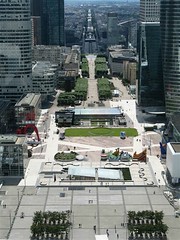Line 14 of the Paris metro is fully automated. The trains do not have driver cabins, but are instead similar to those you would find changing terminals at Frankfurt or Stansted airports (except longer). That is to say: you can look out of the bay window at the front of the train, as it speeds down the tunnel.
This makes it officially the Coolest Public Transport Ever.
I'd started out communicating in restaurants and places of business using only hand gestures and the miserly shreds of French that I can muster. By the third day, I really couldn't be bothered any more, and reverted to English. And yes, the waiters got a lot more rude. Once again, it is a Parisian thing. I got by on hopes that my accent is more European than American or English, and reverting to being Estonian - which means conducting transactions with no eye contact and vague grunts of acknowledgement.
Paris isn't so much smaller than London as easier to navigate - more logical - and easier to grasp. Two full days of hardcore tourism is about sufficient to cover all the major landmarks. Paris also feels foreign in a way that London did not on this trip at least; that neither Rotterdam nor Amsterdam ever did; and that Stockholm hasn't for a long time now. I suppose subconsciously I feel Europe is Germanic.
For some strange reason, I ended up with a first class ticket for the Thalys train to Amsterdam. (Some sort of special offer - it was cheaper for me to buy a discounted 1st class seat than pay full price for 2nd class.) The Eurostar, Thalys and TGV all use the same type of fast electric train, and it really underscores how much sense rail travel makes in Europe. For the price of a cattle-carrier flight bought at short notice, I have a nice, soft seat with my own power outlet, free meal with booze, and a bitchin' view of the French countryside zipping by at 300km/h. Unlike airlines that charge you disproportionately more for business class (this is especially funny on the likes of Estonian Air, where business class gets exactly the same seats, and their advantage is a snack and being the first to get off a plane), the price difference between 1st and 2nd class on railways is quite minor. The final kicker is that while I can arrive at Gare du Nord at noon and step out of Amsterdam Centraal* at five, it would not take me much less time to do the same trip by air, including travel to something like Orly and check-in times. And hey, for a train journey between Schengen countries you don't even need to bring your passport.
As we approach the Belgian capital, the PA comes alive with notice in French that we are about to make a stop at Bruxelles-Midi; then in Dutch and German that Brussel-Zuid is coming up; and finally in English, welcoming us to simply Brussels. Reminds me of the joke about the stubborn blonde in an airplane: "I told her First Class isn't going to Las Vegas."
I'm half disappointed that the Thalys train doesn't have WiFi, but then I'm being Estonian again. Taking connectivity for granted. I'll tell you something though - if one of the Estonian parties runs on a platform (no pun intended) of renovating the Tallinn-Tartu-Riga link to accomodate the European Fast Rail service, they'll have my vote.
---------
*Dutch pronunciation is very entertaining, but in writing it usually just comes down to English with extra vowels.
Tuesday, July 24, 2007
Subscribe to:
Post Comments (Atom)


2 comments:
French are foreign. It took me a while to grok that, but once I got over that particular hump, understanding french and the french got quite a bit easier.
One simply has to accept that just because they look like us, doesn't necessarily mean that they think like us. Our own anglo-saxon-ish upbringing and cultural experiences don't mesh, the french are a completely different breed with appropriately different mindsets.
French are as foreign as chinese, they just live closer.
Sometimes I am wondering how much Dutch accent is in the American English, especially East Coast. Or other way around there must be a reason why American English became different from British English. In Canada it is less American, because it is more British?
Post a Comment